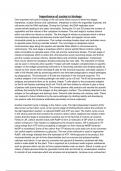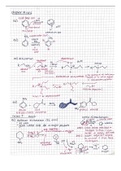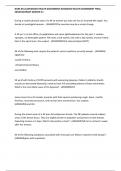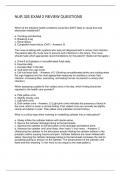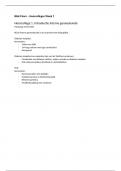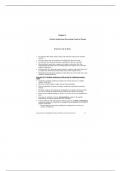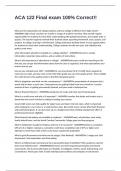Importance of cycles in biology
One important cell cycle in biology is the cell cycle which occurs in three key stages:
interphase, nuclear division and cytokinesis. Interphase is when the organelles duplicate, the
cell grows and the DNA replicates. During the S phase, the DNA replicates semi-
conservatively leading to two sister chromatids. During the G1 and G2 phase the number of
organelles and the volume of the cytoplasm increases. The next stage is nuclear division
which can either be mitosis or meiosis. The first stage of mitosis is prophase which is where
chromosomes condense and become shorter and thicker and appear as two sister
chromatids joined by a centromere. The nuclear envelope breaks down and centrioles move
to opposite poles forming a spindle network. The next stage is metaphase where
chromosomes align along the equator and spindle fibres attach to chromosomes by
centromeres. The next stage is anaphase which is where spindle fibres contract, pulling
sister chromatids to opposite poles of the cell and the centromere divides. The last stage of
mitosis is telophase which is where the chromosomes uncoil, becoming longer and thinner
and the nuclear envelope reforms. Spindle fibres and centrioles breakdown. Cytokinesis
then occurs where the cytoplasm divides producing two new cells. The important of mitosis
can be seen in immunity when specific T helper cell with receptor complementary to specific
antigen on the antigen presenting cell binds to it, becoming activated and dividing rapidly by
mitosis to form clones which stimulate B cells for the humoral response, stimulate cytotoxic T
cells to kill infected cells by producing perforin and stimulate phagocytes to engulf pathogens
by phagocytosis. The production of B cells are important in the humoral response. The
surface antigens of an invading pathogen are taken up by a B cell. The B cell processes the
antigens and presents them on its surface. Helper T cells attach to the processed antigens
on the B cell thereby activating the B cell. The B cell then divides by mitosis to give a clone
of plasma cells [clonal expansion]. The cloned plasma cells produce and secrete the specific
antibody that exactly fits the antigen on the pathogen’s surface. The antibody attaches to the
antigen on the pathogen and destroys them. Some B cells develop into memory cells. These
can respond to future infections by the same pathogen by dividing rapidly and developing
into plasma cells that produce antibodies [secondary immune response].
Another important cycle in biology is the Calvin cycle. The light-independent reaction [LIR],
also known as the Calvin cycle, is the second stage of photosynthesis where the products of
the light dependent reaction i.e reduced NADP and ATP are used. The Calvin cycle occurs
in the stroma and this fluid contains the enzyme rubisco which catalyses this reaction which
means that this stage is temperature sensitive due to the fact that it involves an enzyme.
Firstly in LIR, carbon dioxide reacts with RuBP to form 2 molecules of GP which is a three-
carbon compound. This reaction is catalysed by the enzyme rubisco. GP is reduced to TP
using energy from ATP and by accepting a hydrogen ion from reduced NADP [reduced
NADP is reoxidised]. Some of the carbon from TP leaves the cycle each turn to be converted
into useful organic substances e.g glucose. The rest of the molecule is used to regenerate
RuBP, with energy released from the hydrolysis of ATP. Whilst glucose is the product, this
monosaccharide can join to form disaccharides such as sucrose and polysaccharides
cellulose and starch. It can also be converted into glycerol & therefore combined with fatty
acids to make lipids for the plant. This is important as it produces useful organic substances
such as glucose which can join to form polysaccharides such as starch. Starch is made up of
chains of ɑlpha glucose linked by glycosidic bonds that are formed by condensation reaction.
It consists of two molecules which are amylose and amylopectin. Amylose is an unbranched
One important cell cycle in biology is the cell cycle which occurs in three key stages:
interphase, nuclear division and cytokinesis. Interphase is when the organelles duplicate, the
cell grows and the DNA replicates. During the S phase, the DNA replicates semi-
conservatively leading to two sister chromatids. During the G1 and G2 phase the number of
organelles and the volume of the cytoplasm increases. The next stage is nuclear division
which can either be mitosis or meiosis. The first stage of mitosis is prophase which is where
chromosomes condense and become shorter and thicker and appear as two sister
chromatids joined by a centromere. The nuclear envelope breaks down and centrioles move
to opposite poles forming a spindle network. The next stage is metaphase where
chromosomes align along the equator and spindle fibres attach to chromosomes by
centromeres. The next stage is anaphase which is where spindle fibres contract, pulling
sister chromatids to opposite poles of the cell and the centromere divides. The last stage of
mitosis is telophase which is where the chromosomes uncoil, becoming longer and thinner
and the nuclear envelope reforms. Spindle fibres and centrioles breakdown. Cytokinesis
then occurs where the cytoplasm divides producing two new cells. The important of mitosis
can be seen in immunity when specific T helper cell with receptor complementary to specific
antigen on the antigen presenting cell binds to it, becoming activated and dividing rapidly by
mitosis to form clones which stimulate B cells for the humoral response, stimulate cytotoxic T
cells to kill infected cells by producing perforin and stimulate phagocytes to engulf pathogens
by phagocytosis. The production of B cells are important in the humoral response. The
surface antigens of an invading pathogen are taken up by a B cell. The B cell processes the
antigens and presents them on its surface. Helper T cells attach to the processed antigens
on the B cell thereby activating the B cell. The B cell then divides by mitosis to give a clone
of plasma cells [clonal expansion]. The cloned plasma cells produce and secrete the specific
antibody that exactly fits the antigen on the pathogen’s surface. The antibody attaches to the
antigen on the pathogen and destroys them. Some B cells develop into memory cells. These
can respond to future infections by the same pathogen by dividing rapidly and developing
into plasma cells that produce antibodies [secondary immune response].
Another important cycle in biology is the Calvin cycle. The light-independent reaction [LIR],
also known as the Calvin cycle, is the second stage of photosynthesis where the products of
the light dependent reaction i.e reduced NADP and ATP are used. The Calvin cycle occurs
in the stroma and this fluid contains the enzyme rubisco which catalyses this reaction which
means that this stage is temperature sensitive due to the fact that it involves an enzyme.
Firstly in LIR, carbon dioxide reacts with RuBP to form 2 molecules of GP which is a three-
carbon compound. This reaction is catalysed by the enzyme rubisco. GP is reduced to TP
using energy from ATP and by accepting a hydrogen ion from reduced NADP [reduced
NADP is reoxidised]. Some of the carbon from TP leaves the cycle each turn to be converted
into useful organic substances e.g glucose. The rest of the molecule is used to regenerate
RuBP, with energy released from the hydrolysis of ATP. Whilst glucose is the product, this
monosaccharide can join to form disaccharides such as sucrose and polysaccharides
cellulose and starch. It can also be converted into glycerol & therefore combined with fatty
acids to make lipids for the plant. This is important as it produces useful organic substances
such as glucose which can join to form polysaccharides such as starch. Starch is made up of
chains of ɑlpha glucose linked by glycosidic bonds that are formed by condensation reaction.
It consists of two molecules which are amylose and amylopectin. Amylose is an unbranched

